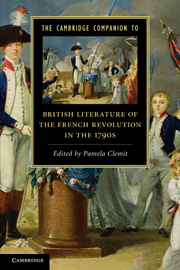Book contents
- Frontmatter
- 1 The Political Context
- 2 Burke, Reflections On The Revolution In France
- 3 Paine, rights Of Man
- 4 Burke And Paine: Contrasts
- 5 Wollstonecraft, vindications and historical And Moral View Of The French Revolution
- 6 Godwin, Political Justice
- 7 Wollstonecraft and Godwin: dialogues
- 8 Popular radical culture
- 9 Counter-revolutionary culture
- 10 Women’s voices
- 11 Novels of opinion
- 12 Revolutionary drama
- 13 Politics and poetry
- Guide to further reading
- Index
- The Cambridge Companions to...
10 - Women’s voices
Published online by Cambridge University Press: 28 July 2011
- Frontmatter
- 1 The Political Context
- 2 Burke, Reflections On The Revolution In France
- 3 Paine, rights Of Man
- 4 Burke And Paine: Contrasts
- 5 Wollstonecraft, vindications and historical And Moral View Of The French Revolution
- 6 Godwin, Political Justice
- 7 Wollstonecraft and Godwin: dialogues
- 8 Popular radical culture
- 9 Counter-revolutionary culture
- 10 Women’s voices
- 11 Novels of opinion
- 12 Revolutionary drama
- 13 Politics and poetry
- Guide to further reading
- Index
- The Cambridge Companions to...
Summary
After the fall of the Bastille in July 1789, British women took to their pens. They were already writing novels, lyric poetry, conduct books – genres dominated by women and the ones to which they had been historically relegated. Now urgent political concerns surfaced in their domestic tales. Women tried their hands at historical writing, traditionally a male preserve, and experimented with a variety of unladylike genres: proto-journalism, polemic and life-writing in the form of memoirs. They all wrote letters which they deployed for purposes beyond personal communication. As a result, through the 1790s a ‘women's war’ took shape in print in which their reactions to momentous events across the English Channel kept pace with those of their male contemporaries.
Like men, women expressed a range of complex positions on the religious and political issues of the day. But a curious thing happened: in joining the debate, women writers found themselves and what they wrote becoming enmeshed in the French Revolution quarrel. Writing about politics, they risked being viewed as suspect agents of a cross-Channel movement to radicalize Britain. In the extended crisis during the 1790s, women's intrusion into the male republic of letters signalled momentous changes in gender dynamics. The ancient question of the nature of woman was now debated against the backdrop of impending reforms in education, and the possibility of reform of laws concerning women. There was no more explosive topic for women to write about than the ‘woman question' itself. The Revolution debate became even more contentious as it incorporated competing views on women's nature, roles and education.
- Type
- Chapter
- Information
- Publisher: Cambridge University PressPrint publication year: 2011
- 3
- Cited by



